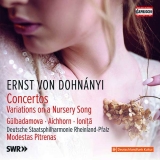Ernst von Dohnanyi war ein Freund von Johannes Brahms, der seine Musik schätzte. Umgekehrt war es natürlich auch der Fall, weswegen Dohnanyi immer wieder als Brahms-Epigone charakterisiert wird. Damit wird man dem Komponisten natürlich überhaupt nicht gerecht. Generell helfen derartige Vergleiche nicht viel weiter. Kein Komponist lebt im Vakuum, sondern schöpft immer aus Traditionen, die er sich zu eigen macht und weiterentwickelt.
So auch bei Ernst von Dohanyi, in dessen frühem Konzertstück für Cello Brahms und Dvorak wohl noch über die Schulter schauten. Andrei Inoita als Solist und die Deutsche Staatsphilharmonie Rheinland-Pfalz verzichten auf überflüssige Effekte und geben der wunderschönen kantablen Partie des Cellos viel Raum, so dass die melodischen Bögen ihre volle Wirkung entfalten können.
Mit der Harfe schafft Ernst von Dohnanyi Reminiszenzen an seine ungarische Heimat und das typische Volksinstrument, die Zymbal. Das Concertino ist des Komponisten vorletztes großes Werk. Ein Hauch von Nostalgie, von Wehmut schwingt mit, und Silke Aichhorn nimmt sich der Partitur mit viel Sensibilität an, stets in klanglich perfekter Balance mit dem Orchester, das die filigranen Töne der Harfe sehr schön aufgreift und durch sein intimistisches Spiel die Klangpalette fein erweitert.
Diesen beiden Werken geht eine muntere, kecke, verspielte Interpretation der Variationen über das Volkslied ‘Ah vous dirai-je Maman’ (in Deutschland auch als ‘Morgen kommt der Weihnachtsmann’ bekannt) voran.
In elf Variationen inklusive Finale zeigen Sofja Gülbadamova am Klavier und die Deutsche Staatsphilharmonie Rheinland-Pfalz unter Modestas Pitrenas, wie geschickt sie sich, mit Ernst und Esprit, in unterschiedlichsten Stilformen bewegen.
Ernst von Dohnanyi was a friend of Johannes Brahms, who appreciated his music. The reverse was also true, of course, which is why Dohnanyi is repeatedly characterized as a Brahms epigone. This, of course, does not do justice to the composer at all. In general, such comparisons do not help much. No composer lives in a vacuum, but always draws from traditions which he makes his own and develops further.
This was also the case with Ernst von Dohanyi, in whose early concert piece for cello Brahms and Dvorak were probably still looking over their shoulders. Andrei Inoita as soloist and the Deutsche Staatsphilharmonie Rheinland-Pfalz dispense with superfluous effects and give the cello’s beautiful cantabile part plenty of space so that the melodic arches can unfold their full effect.
With the harp, Ernst von Dohnanyi creates reminiscences of his Hungarian homeland and the typical folk instrument, the cymbal. The Concertino is the composer’s penultimate major work. A touch of nostalgia, of wistfulness resonates, and Silke Aichhorn takes on the score with great sensitivity, always in tonally perfect balance with the orchestra, which picks up the filigree tones of the harp very beautifully and finely expands the sound palette through its intimate playing.
These two works are preceded by a lively, sparkling, playful interpretation of the variations on the folk song ‘Ah vous dirai-je Maman’ (also known in Germany as ‘Morgen kommt der Weihnachtsmann’).
In eleven variations including the finale, Sofja Gülbadamova on piano and the Deutsche Staatsphilharmonie Rheinland-Pfalz under Modestas Pitrenas show how skillfully they move, with seriousness and esprit, in a wide variety of styles.
























